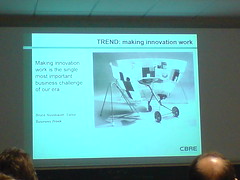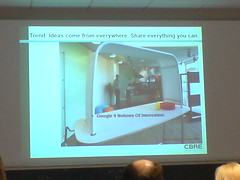LIFT07: Collaboration and Innovation in Workspace that Works
LIFT07: Collaboration and Innovation in Workspace that Works - Clark Elliott
CE starts the session by getting us all to stand up and touch hands with 5 other people in the room.
"What's work in the 21st century? I think Dilbertville is dead. I'm a space planner, a workspace strategist. Studied social psychology. The french word "travail" comes from the Latin word for "torture". The word "labour" has connotations with pain. In the 21st century, this word has nothing to do with knowledge work - we're not doing physical labour."
CE shows coloured map of a network of communications within a real company - not an organogram, a real documentation of what's there.
 "So how might you organise office buildings?"
"So how might you organise office buildings?"
CE goes around the room asking attendees what they want out of the session. Most interesting ones I heard were a couple of Swedish industrial design students studying crowded spaces and queuing strategies - wow - and a Swiss guy who, in a strong French accent, talks about how he cannot concentrate at work because "my colleague, she eez so beautiful..." :)
CE: Themes there were collaboration, virtual collaboration, obstacles to change, relationships, enjoyable, interacting with human beings (even when somewhere else). It's all about the intersection between technology, people and space. Communicating properly over virtual methods (e.g. video-conferencing) is difficult.
CE: There's a lot of resistance to change: closed-office workers don't want open space. Senior managers see loss of offices as loss of status. Concentration and interruptions are a factor. On Lake Geneva is a beautiful building but useless office: many closed rooms. People send emails to someone 3 feet away. The phsyical space stops communication. At the UN you have issues of status (certain grades get the right to numbers of windows). But the goal of the business is to produce results.
(So far so good: people don't like change and you need communication in office spaces. Nothing particularly ground-breaking here)
CE: If you create modern office environments you should change everything. You don't get teamwork between a group of folks who are all compensated radically differently. Space-planning strategies need to understand the organisation. Cultures are driven by cost and quality control. Creative thinking is what this is about: we're knowledge workers.
(Wondering to myself what %age of the global working population are "knowledge workers". Definitely over-represented in the LIFT07 delegates ;))
CE: Trend: activity based design. Shows example of a large company with different "zones": printing area, confrence room, mobile workers, etc. 600 mobile staff, 600 fixed staff, lots of desk-sharing. 200 workplaces for the 600 workers, but lots of other areas to work on. There were no reservations for workplaces: first come first served. If you do desk-sharing there has to be enough space that no-one can't find somewhere and going home.
CE: Trend: 80% of meetings take less than 8 minutes. Shows slide: "when time spent reviewing a project with co-workers starts to feel more like good friends making plans and sharing stories, we'll know that effective workspaces have hit the mark". Talks about desk-sharing: you can theorise about it, people will get all sorts of "yeah but" reasons. Just try it, and give people the reason for doing it: not to save space or money, but to get people communicating better.
CE: People don't like moving furniture around.
Q: how do you stop people going to old habits, marking out their territory and keeping it?
CE: It happens. Over the years in Vienna we created a user guide, handbook and groundrules. You say "mobile desks are for everybody". The cleaners clean the desks completely - there's no paper kept around.
Q: But personalisation is everything?
CE: Every worker had their own storage area for filing, mobiles, etc. I didn't take away your desk, I gave you a bureau buffet. The whole floor is your office.
(I like bits about this, but confess to being cynical about it in its entirety for, say, a company like FP: though I can see the value in physically arranging project teams together)
Q: What about working from home?
CE: It brings up a series of issues. At DEC, Compaq, HP, and Cable & Wireless, we did not push home working. In the UK it's pushed to a high level because of commuting, traffic, and environmental impact of travel. In Geneva people don't have large houses, there's no space for it. What's the insurance impact of folks working at home? How do you stop people getting isolated or disconnected from their co-workers?
Q: How do you fight management resistance to not being able to see their staff?
CE: Through illustration and showing results.
Q: Trend: "the new R&D lab is the break area".
Q: Trend: "Ideas come from everywhere. Share what you can."
 (Shows a diagram for a weird "mobile coffee drinking table" which quite frankly scares me)
(Shows a diagram for a weird "mobile coffee drinking table" which quite frankly scares me)
Q: You say that you've had proposals on the table for the UN but not gotten anywhere. Are there ways of improving an environment within existing physical structures?
CE: Yes: first thing, start with an open-door policy: leave doors open unless you're in a meeting. Drilling an "oculus" in doors so passers-by can see in if they need to and get visual feedback. "Management by walking around".
CE: Trend: "Walk away from noise and focus". People in Paris use speakerphone a great deal, for some reason - which is impolite and disrespectful, it's a source of distraction and so something which needs to be handled when creating the overall environment.
CE: Average work hours per day in the knowledge sector are now 9.1h. We have a need for privacy within this time and for general business dealings.
BREAK
CE: Dividers within offices should be low enough to see other folks' eyes - so you can see whether you can interact with others. (i.e. to allow glancing). Open space, visibility and interaction is what this is about - but different zones within an office area allow for privacy.
Q: How do you approach ergonomics?
CE: With adjustable desks and chair heights.
CE: What are the supposed benefits of open space? Communication, easy collaboration, easy knowledge sharing by osmosis. In Zurich, a bit objection to mobile working was "how will I find my boss"?
CE: What are the obstacles for collaboration?
Audience: Managers can use open space offices to get cheap space and do watch staff, which leads to a lack of innovation (err apparently - not sure I follow that, but maybe I'm one of those managers that loves stifling innovation ;)).
CE: Shows off Herman Miller offices in Bristol. Knoll+DEGW (architects) office in London. Shows off ludicrous tricycle desk.
Q&A follows. I mentioned our lovely Nabaztag CC plugin as a means of exposing virtual state physically.
CE: Chairs at desks are in use 35% of the time on average. Even fixed workers move around; that real estate isn't used 65% of the time.
CE: Stress is not caused by too much work, or buried fight-and-flight reflexes: it's about arbitrary decisions which aren't explained.